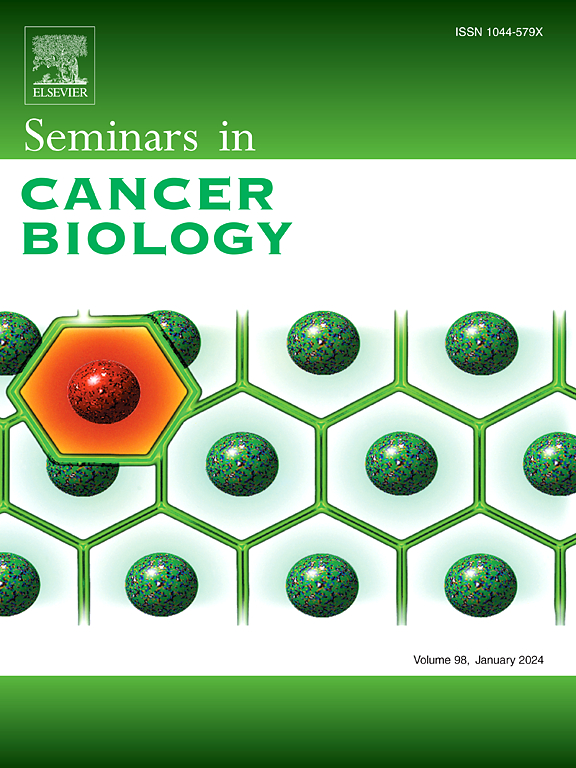Reshaping the immune microenvironment and reversing immunosenescence by natural products: Prospects for immunotherapy in gastric cancer
IF 12.1
1区 医学
Q1 ONCOLOGY
引用次数: 0
Abstract
Gastric cancer (GC) represents a global health-care challenge. Recent progress in immunotherapy has elicited attracted considerable attention as a viable treatment option through modulating the host immune system and unleashing pre-existing immunity, which has profoundly revolutionized oncology, especially GC. Nonetheless, low clinical response and intrinsic and acquired resistance remain persistently challenging. The microenvironment of GC comprising multifarious stromal cell types has remarkable immunosuppressive elements that may impact the efficacy of immunotherapy. Immunosenescence is increasingly regarded as a factor that contributes to cancer development, remodels the tumor microenvironment and affects the efficacy of immunotherapy. Natural products are at the forefront of traditional medicine. Senotherapeutics is a class of drugs and natural products capable of delaying, preventing, or reversing the senescence process (i.e., senolytics) or suppressing senescence-associated secretory phenotype (i.e., senomorphics). Emerging evidence supports that natural products can improve the efficacy of existing immunotherapy and expand their indications in GC mainly based upon remodeling the immunosuppressive microenvironment and reversing immunosenescence. The review provides an integrated review of previously reported and ongoing clinical trials with immunotherapeutic regimens in GC and discusses current challenges. Next, we focus on natural compounds that exert anti-GC functions and possess immunomodulatory properties. More attention is paid to the potential of these natural compounds in modulating the immune microenvironment and immunosenescence. Lastly, we discuss the nanomedicine that can overcome the deficiencies of natural products. Altogether, our review suggests the enormous potential of natural compounds in GC immunotherapy, and provides an important direction for future research.
天然产物重塑免疫微环境和逆转免疫衰老:胃癌免疫治疗的前景。
胃癌(GC)是一项全球性的卫生保健挑战。近年来,免疫疗法作为一种可行的治疗选择,通过调节宿主免疫系统和释放预先存在的免疫,引起了相当大的关注,这已经深刻地改变了肿瘤学,特别是胃癌。然而,低临床反应和内在和获得性耐药仍然具有挑战性。由多种基质细胞类型组成的胃癌微环境具有显著的免疫抑制因子,可能影响免疫治疗的效果。免疫衰老越来越被认为是促进癌症发展、重塑肿瘤微环境和影响免疫治疗效果的一个因素。天然产品是传统医学的前沿。衰老治疗药物是一类能够延缓、预防或逆转衰老过程(即抗衰老药物)或抑制衰老相关分泌表型(即衰老形态)的药物和天然产物。新出现的证据支持天然产物主要通过重塑免疫抑制微环境和逆转免疫衰老来改善现有免疫治疗的疗效,扩大GC的适应症。该综述对先前报道的和正在进行的GC免疫治疗方案临床试验进行了综合综述,并讨论了当前的挑战。接下来,我们将重点关注发挥抗gc功能并具有免疫调节特性的天然化合物。人们越来越关注这些天然化合物在调节免疫微环境和免疫衰老方面的潜力。最后,我们讨论了纳米药物可以克服天然产物的不足。综上所述,我们的研究表明天然化合物在GC免疫治疗中的巨大潜力,并为未来的研究提供了重要的方向。
本文章由计算机程序翻译,如有差异,请以英文原文为准。
求助全文
约1分钟内获得全文
求助全文
来源期刊

Seminars in cancer biology
医学-肿瘤学
CiteScore
26.80
自引率
4.10%
发文量
347
审稿时长
15.1 weeks
期刊介绍:
Seminars in Cancer Biology (YSCBI) is a specialized review journal that focuses on the field of molecular oncology. Its primary objective is to keep scientists up-to-date with the latest developments in this field.
The journal adopts a thematic approach, dedicating each issue to an important topic of interest to cancer biologists. These topics cover a range of research areas, including the underlying genetic and molecular causes of cellular transformation and cancer, as well as the molecular basis of potential therapies.
To ensure the highest quality and expertise, every issue is supervised by a guest editor or editors who are internationally recognized experts in the respective field. Each issue features approximately eight to twelve authoritative invited reviews that cover various aspects of the chosen subject area.
The ultimate goal of each issue of YSCBI is to offer a cohesive, easily comprehensible, and engaging overview of the selected topic. The journal strives to provide scientists with a coordinated and lively examination of the latest developments in the field of molecular oncology.
 求助内容:
求助内容: 应助结果提醒方式:
应助结果提醒方式:


